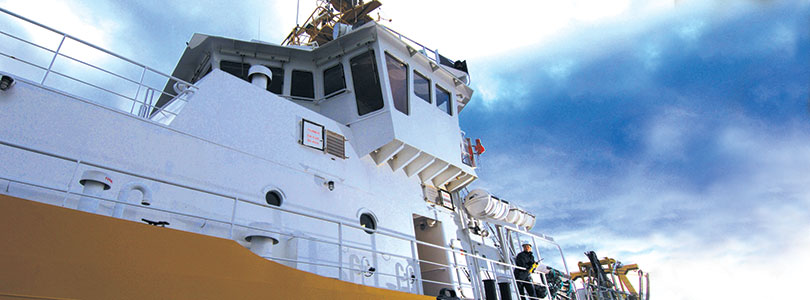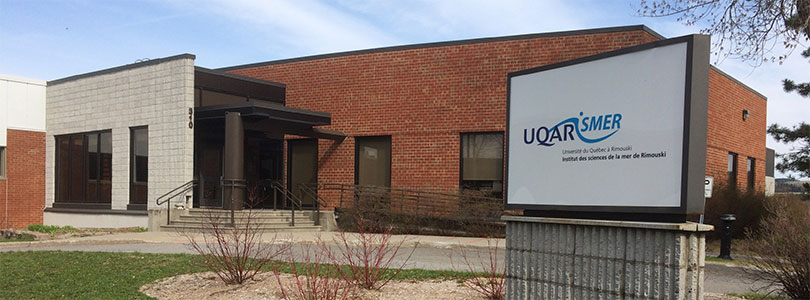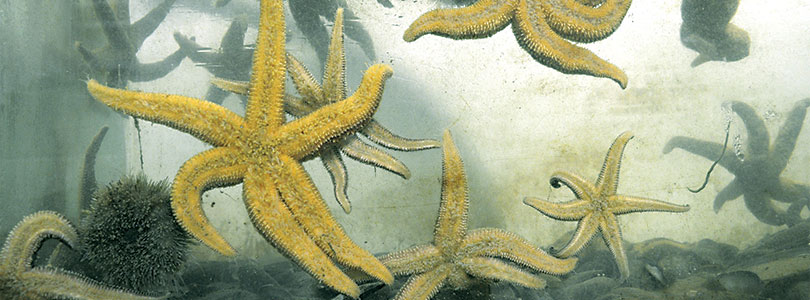


From it's begining, Université du Québec à Rimouski has been at the forefront of the study and understanding of the marine environment.
The recognition of marine sciences as an area of excellence has enabled UQAR to develop a sizeable research capacity in the field. Today, UQAR has brought together a remarkably strong group of researchers, whose expertise touch on a vast array of questions in the field of marine sciences.
UQAR's diverse field of marine sciences
The Marine science institute (UQAR-ISMER) and oceanography
The Institut des sciences de la mer de Rimouski enjoys international recognition as the flagship of Quebec research in this field.
Located on the Rimouski campus, the institute has world-class reseach infrastructures and it brings together a critical mass of researchers and students of various disciplines, devoted to the discovery and advancement of knowledge on coastal environments with a view to sustainable development.
The Institute brings together a community of researchers from UQAR and other associated institutions with a variety of academic backgrounds: biology, chemistry, physics, geology, remote sensing, and aquaculture. These experts focus specifically on marine ecosystems processes in relationship to climate change, the impacts of human activities on ecosystems, marine resource exploitation, maritime geology, and natural hazards.
Maritime resource management
Management sciences are equally crucial to the research being undertaken in marine sciences. Integrated and sustainable management of marine resources requires knowledge in a number of fields in order to successfully build strategies and make operational decisions. This field brings together specialists in economics, management, finance, natural sciences, and law with experience in fisheries management, maritime transportation, and environmental studies.
Researchers study the economic problems that are specific to the maritime sector, including fishing, transformation, commercialization, aquaculture, biotechnologies and transportation.
Biologie, chimie et géographie
In relationship to marine sciences, UQAR has developed a large body of expertise in the areas of biology, chemistry, and geography (in French). Teams of biologists and chemists study, among other things, the exploitation of marine biomolecules, aquatic environment pollution, ocean acidification and the impact of climate change on marine environments, fish ecophysiology, aquaculture, and seabirds.
Researchers in geography focus on natural hazards, shoreline erosion, coastal geomorphology, marine remote sensing, integrated coastal area management, river dynamics and sediment transport, as well as on the biogeochemistry of intertidal and coastal systems.
Regional Development
In the field of regional development (in French), researchers and students specifically analyze the socio-territorial dynamics of the marine environment in Quebec and create development assistance tools. Understanding the socio-territorial dynamics of coastal regions is indeed essential to being able to develop assistance tools.
Research looks specifically at the impacts of development policies on the regional economy, the social acceptability of natural resource exploitation projects, and local community adaptation to climate change.
Engineering
UQAR is home to a wide range of expertise in the mechanical and electrical engineering fields (in French), which has allowed for the development of a variety of projects, including automation and optimization of marine microalgae cultivation in photobioreactors for biofuel production.
UQAR also offers civil engineering training with a specialization in coastal engineering unique in Canada
Cutting-edge research units
Historically, the field of marine sciences is central to research at UQAR. The Rimouski Marine Science Institute and its researchers bring together a critical mass of experts and important achievements in the field.
Highly specialized research infrastructure
UQAR has cutting-edge infrastructure that offers researchers unique research potential. Over the past decade, more than $50M have been invested in infrastructure, including equipment, to support the marine science sector in the Rimouski region, in particular at UQAR-ISMER.
UQAR has a variety of research tools that allow it to position itself as a world leader in the vast field of marine science. In addition to high-performance oceanography instruments and laboratories equipped with the latest technologies, ISMER researchers enjoy two major infrastructures: an oceanography research vessel and an aquaculture station.
Oceanographic research vessel Coriolis II
In addition to high-performance oceanographic instruments, UQAR has a 50m-long state-of-the-art oceanographic research vessel, equipped with the latest technological innovations.
Coriolis II is a genuine floating laboratory with space devoted exclusively to lab work. These laboratories make it possible to form multidisciplinary research teams of up to 14 scientists, aside from the ship’s regular crew. It meets the highest standards of maritime certification and can navigate throughout the world. It recently carried out the MARES and MARGES missions for Argentina in the Gulf of San Jorge.
Aquaculture station
UQAR's aquaculture station is a satellite laboratory resembling a marine station, equipped with a high-performance sea water pumping facility that allows for cutting-edge research work throughout the year on a variety of subjects, including aquaculture, marine biology, and ecotoxicology.
The aquaculture station is also equipped with mesocosms for the purpose of ecosystem studies. These intact ecosystem samples taken from the natural environment, are placed in a laboratory and maintained in a controlled environment (temperature, salinity, organic matter, and so on) in order to conduct various studies (hypoxia simulation, addition of contaminants, temperature increase, and variation in the quantity of organic matter, for example).
Support Centre for Innovation through Research (CAIR)
UQAR has set up a wing on its Rimouski campus to foster laboratory spaces for research in chemistry, biology ans oceanography. The mission of the Support Centre for Innovation through Research (CAIR) is to support business innovation and organizations, particulary SMEs, by promoting and facilitating access to UQAR's expertise and high-end equipement.
Examples of state-of-the-art laboratories
- Particle and surface analysis laboratory
- Paleomagnetism of sediments and marine geology laboratory
- Marine chemistry and mass spectrometry
- Simulations and analyses of ocean systems
- Computer-assisted production research laboratory
Undergraduate and graduate study programs with a focus on maritime issues
The University of Quebec at Rimouski (UQAR) is a French-language public university. The links of the programs listed below lead to pages in French.
Graduate programs
The following master’s and doctoral level programs are associated with the area of excellence in marine science.
Oceanography
- Diploma of Higher Specialized Studies in applied oceanography
- Master’s in oceanography
- PhD in oceanography
Maritime resource management
- Diploma of Higher Specialized Studies in maritime resource management
- Master’s in maritime resource management
- Master’s in maritime resource management (profile with a thesis)
- PhD in maritime resource management
Biology
- Diploma of Higher Specialized Studies in wildlife management
- Master’s in wildlife habitat management (research profile)
- PhD in biology
Geography
- Diploma of Higher Specialized Studies in natural hazard analysis and prevention
- Master’s in geography (with a thesis)
- PhD in environmental sciences
Regional development
- Diploma of Higher Specialized Studies in regional and territorial development
- Master’s in regional development
- PhD in regional development
Engineering
- Master’s-level short program in electrical engineering
- Master’s-level short program in electromechanical engineering
- Master’s-level short program in mechanical engineering
- Diploma of Higher Specialized Studies in engineering (coursework)
- Diploma of Higher Specialized Studies in engineering (project)
- Master’s in engineering
- Master’s in engineering (coursework and project)
- PhD in engineering
Undergraduate programs
At the undergraduate level, the following programs, involving associate researchers affiliated with the area of research excellence in marine science, constitute an entry opportunity for students looking to pursue graduate studies in this area.
Biology
- Minor in biology
- Major in biology
- Bachelor’s in biology(major in marine science)
Chemistry
Geography
- Undergraduate short program in environment, geomorphology, and natural hazards
- Major in geography
- Bachelor’s in geography
Engineering
- Bachelor’s in electrical engineering (requirement: pre-university DEC or equivalent)
- Bachelor’s in electrical engineering (requirement: technical DEC or equivalent)
- Bachelor’s in electromechanical systems engineering (requirement: pre-university DEC or equivalent)
- Bachelor’s in electromechanical systems engineering (requirement: technical DEC or equivalent)
- Bachelor’s in mechanical engineering (requirement: pre-university DEC or equivalent)
- Bachelor’s in mechanical engineering (requirement: technical DEC or equivalent)
Other programs
The Bachelor’s degree in administration also allows students to pursue graduate studies in the field of marine resource management. Finally, every year, ISMER's Oceanography Summer School welcomes graduate students who wish to take a short introduction to coastal oceanography.
An engine of maritime development
UQAR's activities in the maritime sector have led the university to become a founding partner of Quebec Maritime Technocity. This leadership has undeniably made UQAR a driving force behind the current positioning of Quebec and Canada as international centers of expertise in marine sciences.UQAR's activities in the maritime sector have led the university to become a founding partner of Quebec Maritime Technocity.
This leadership has undeniably made UQAR a driving force behind the current positioning of Quebec and Canada as international centers of expertise in marine sciences.UQAR has contributed to the establishment of numerous organizations that today play a major role in sustainable maritime development in Quebec and Canada.

Key Facts
- Funding of $10M/year on average is devoted to maritime environment research
- More than $20M have been invested in research equipment over a three-year period
- Over 350 research projects have been carried out over the last five years
| 25% faculty resources 34% research units 5 Bachelor’s programs 6 Master’s programs 6 PhD programs Over 300 students per yeare |